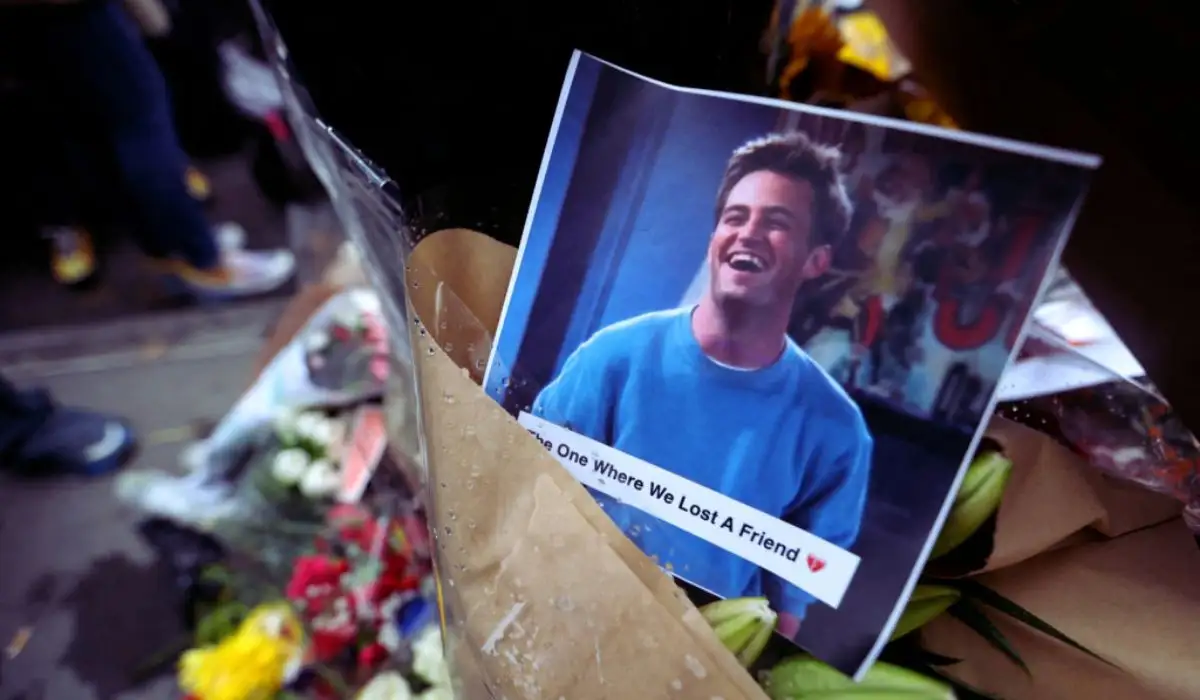In a shocking turn of events surrounding the tragic death of beloved actor Matthew Perry, Dr. Mark Chavez, one of the two doctors implicated in Perry’s fatal ketamine overdose, expressed deep remorse for his involvement in the events that led to the actor’s untimely demise. As legal proceedings continue, Dr. Chavez has accepted responsibility for his actions and is actively cooperating with authorities.
The Friends Star’s Tragic Death
Matthew Perry, known worldwide for his role as Chandler Bing on the hit TV show FRIENDS, passed away on October 28, 2024, at the age of 54. Perry was found unresponsive in the jacuzzi of his Los Angeles home. An autopsy later confirmed that the cause of death was acute ketamine toxicity. The revelation of ketamine as the cause of death has led to a web of legal ramifications for several individuals tied to Perry’s acquisition and use of the drug.

Legal Developments and Chavez’s Plea Agreement
Dr. Mark Chavez appeared in federal court in Los Angeles to face charges related to conspiracy to distribute ketamine. In the face of mounting evidence, Chavez has agreed to plead guilty to one count of conspiracy and signed a plea agreement with federal prosecutors. The agreement is part of a larger investigation into the circumstances surrounding Perry’s death, with Chavez being just one of five individuals charged in connection with the illegal distribution of ketamine to the actor.
During his court appearance, Chavez acknowledged his understanding of the charges and expressed regret through his attorney, Matthew Binninger. Speaking to the press, Binninger emphasized that Chavez is doing everything possible to make amends for his role in the tragedy. “He is incredibly remorseful and fully accepts responsibility,” Binninger said, adding that Chavez has taken steps to cooperate with the investigation and help in any way he can.
Consequences for Dr. Mark Chavez
As part of his plea deal, Dr. Chavez has agreed to immediately surrender his medical license, effectively ending his career as a physician. While he pleaded not guilty at the arraignment, a change of plea hearing is expected to take place in October, where he will officially enter a guilty plea. Chavez faces up to 10 years in prison for his involvement in the distribution of ketamine that led to Perry’s death.
Chavez’s involvement in the case traces back to his dealings with another defendant, Dr. Salvador Plasencia. Chavez had known Plasencia for over two decades, and prosecutors allege that Chavez supplied Plasencia with ketamine, fully aware that it would be sold to Perry, who was battling an addiction to the drug.
The Broader Criminal Network
Dr. Plasencia is considered a key figure in the illegal network that facilitated Perry’s ketamine use. Along with Plasencia, another key player in the case is Jasveen Sangha, known by authorities as the “Ketamine Queen,” who is accused of supplying the ketamine that ultimately led to Perry’s fatal overdose. Both Plasencia and Sangha have pleaded not guilty to the charges against them.
The case has also implicated Eric Fleming, who admitted to distributing the ketamine that killed Perry, and Kenneth Iwamasa, Perry’s live-in assistant. Iwamasa admitted to administering the lethal dose on the day Perry died. Both Fleming and Iwamasa have signed plea agreements and are awaiting sentencing.
Chavez’s Involvement in the Scheme
According to court documents, Chavez had a history with ketamine that extended beyond his interactions with Perry. In 2023, after a dispute with his business partner at a San Diego ketamine infusion clinic, Chavez left the clinic but took a number of drugs with him, including vials of ketamine and lozenges. Chavez obtained these substances using fraudulent prescriptions.
Between September and October of 2023, Chavez and Plasencia met multiple times to discuss supplying Perry with ketamine. Chavez reportedly transferred at least 22 vials of liquid ketamine and nine lozenges to Plasencia, knowing that Perry was the intended recipient. Court documents reveal that Plasencia even dosed Perry in a car near a public aquarium, an action that Chavez later reprimanded him for, citing concerns about dosing people in public places.
As investigators closed in on Chavez, his actions became increasingly erratic. Despite learning that the California Medical Board was investigating him for improperly taking ketamine from his former clinic, Chavez continued his dealings with Plasencia until just weeks before Perry’s death.
The Fallout from the Case
Following Perry’s death, the DEA began investigating the underground network that provided the actor with ketamine. During interviews with DEA agents, Chavez attempted to cover his tracks, denying that he still possessed any of the ketamine he had taken from the clinic. However, Chavez eventually admitted to submitting a fraudulent prescription and acknowledged his role in supplying the drug to Plasencia, though he continued to conceal some details from investigators.
Chavez’s arrest and eventual guilty plea are part of a broader crackdown on the illegal distribution of controlled substances to vulnerable individuals, especially those battling addiction like Matthew Perry. Federal authorities continue to pursue charges against other members of the network, with the goal of holding everyone involved accountable for their roles in the actor’s death.
The Bottom Line
The death of Matthew Perry has sent shockwaves through the entertainment industry and highlighted the dangers of ketamine misuse. Dr. Chavez’s acceptance of responsibility offers a glimpse into the culpability of those involved in the actor’s tragic end. While justice moves forward, the loss of a beloved figure like Perry serves as a stark reminder of the devastating consequences of addiction and the need for greater accountability in the medical community.
The next hearing in Chavez’s case is scheduled for October, with his formal guilty plea expected at that time.
Also read: Family Of Richard Simmons Breaks Silence On Fitness Legend’s Cause Of Death!

